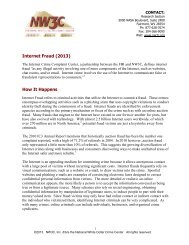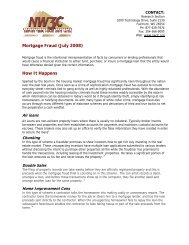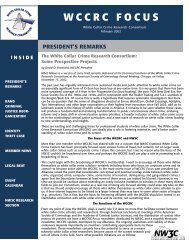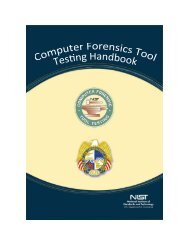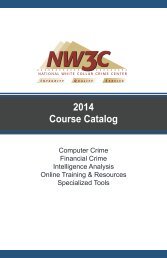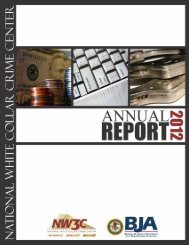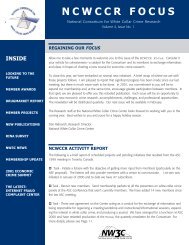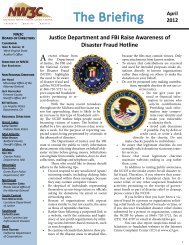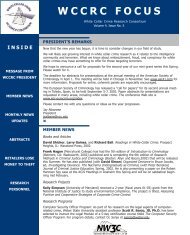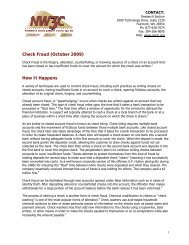Informant Vol 10 No 2 - 2013 Spring - National White Collar Crime ...
Informant Vol 10 No 2 - 2013 Spring - National White Collar Crime ...
Informant Vol 10 No 2 - 2013 Spring - National White Collar Crime ...
You also want an ePaper? Increase the reach of your titles
YUMPU automatically turns print PDFs into web optimized ePapers that Google loves.
can lead to enhanced bidding. Enhanced bidding providesincreased returns for the sellers and the auction companiesthat receive a percentage of the final sale price. Italso creates an environment in which these vehicles canbe used by criminals to defraud consumers or perpetrateother hard-to-trace crimes.Who are the players in perpetrating the fraud?After Hurricane Katrina hit the Gulf Coast in 2005,large numbers of flood damaged cars were reintroducedto the consumer marketplace. This was able to occur inpart due to weaknesses in the system at the time. Many improvementshave since been put into place to help addressthese weaknesses, including getting the <strong>National</strong> MotorVehicle Title Information System (NMVTIS) operational.NMVTIS is an electronic system established by federallaw in 1992 that enables state titling agencies, law enforcement,consumers, automotive recyclers and insurance carriersto access and verify key automobile titling information,including brand history. NMVTIS provides statesand consumers with enhanced protection from title fraud,making it more difficult for criminals to use salvage vehiclesfor criminal purposes, and provides better tools for law enforcementto identify, investigate and prosecute auto-relatedcrimes. As of 2009, all entities that handle used or junk vehicles,including insurers, fleet operators such as rental carcompanies, salvage pools, tow operators, automotive dismantlersand recyclers and others, are required by federalregulation to report to NMVTIS each salvage vehicle theytake into their possession, with some limited exceptions.However, even with the federal reporting and recordingrequirements of NMVTIS and the Odometer Act inplace, major businesses involved in the sale of used andsalvage vehicles and the parties that resell those vehiclesdomestically and internationally have continued to findopportunities to game the system.In fact, after Hurricane Sandy hit the mid-Atlanticstates in October 2012, NSVRP followed a sample of 213Hurricane Sandy flood-loss vehicles that were offered forsale through a number of salvage auctions which werenoted by those auctions on their websites as having beenflood-damaged vehicles. Of the 213 vehicles sampled, 123of those vehicles were not reported by these auctions intothe NMVTIS system as having been handled, as requiredunder federal law.Consumers may not be aware the used vehicle theyare purchasing once looked like this, and substandardrepairs may place them in danger.It appears that the problems with titling, brandingavoidance, NMVTIS non-compliance and title skippinghave been deliberate on the part of many parties, includingsalvage auto auction chains, the suppliers of the vehiclessuch as insurers and rental car companies, and others,and that the violations have taken place in spite of clearnotifications and policy advisories issued by the U.S. Departmentof Justice (DOJ), <strong>National</strong> Highway Traffic SafetyAdministration and other parties. The sales took placeover the Internet, with improperly titled or improperlybranded vehicles and where other federal violations ofNMVTIS or the Odometer Act took place. In many cases,the vehicles themselves crossed state boundaries.A significant new and alarming trend consists of largevolumes of inaccurately clean-title cars being bought forexport as part of trade-based money-laundering schemes(TBML). According to the founder of auto auction companyCopart, the fraction of cars being bought from theCopart pools by international buyers is now roughly 25percent of total sales. In December 2011 the U.S. indicted30 dealers under the USA Patriot Act for purchasing usedand salvage vehicles on behalf of Hezbollah and allegedlyshipping them to Benin for resale, with the funds depositedin accounts at the Lebanese Canadian Bank and transferredinto Hezbollah-controlled accounts. The amount ofmoney involved is substantial and was noted in the indictmentsto have been as much as $200 million dollars in onemonth.WWW.NW3C.ORG 15



